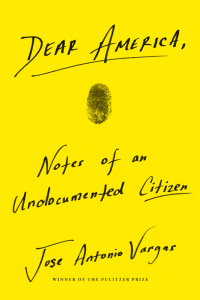Take a photo of a barcode or cover
challenging
emotional
informative
medium-paced
informative
inspiring
slow-paced
Jose Antonio Vargas is a Pulitzer Prize winning journalist who founded Define American, a “nonprofit media and culture organization that uses the power of story to transcend politics and shift the conversation about immigrants, identity, and citizenship in a changing America.” He was born in the Philippines but has lived in the U.S. since he was 12 years old. After finding his out papers were fake while applying for a driver’s permit, he spent several years navigating a sense of homelessness in the place he calls home. In 2011, he wrote an essay for The New York Times Magazine and publicly “came out” as undocumented.
DEAR AMERICA: Notes of an Undocumented Citizen is Vargas’ story of “lying, passing, and hiding.” It’s a small book that asks big questions about what it means to be “American” as an individual and in terms of national identity. He explores a lot a themes, from the personal to the big picture.
On a personal level, Vargas honestly discusses the psychological effects of family separation and not being able to “settle down.” With the threat of deportation looming, being in-limbo prevents him from staying present. Even though his undocumented status isn’t a secret, that doesn’t mean the feelings of uncertainty disappear.
Vargas' internal journey also meant questioning America and looking at the country's policies. He doesn’t ask the reader to side with a political party or to look at him as an the “good immigrant," but to be critical of the perception of the U.S. as a "nation of immigrants" by presenting revelatory facts and thoughtful perspectives on how much race, class, and immigration are intertwined and embedded in the fabric of the U.S. A few of the points that stayed with me:
- Media portrayals and rhetoric that criminalize and commodify the immigrant experience.
- Being asked to “get in line” to become a citizen when “THERE IS NO LINE.” There’s no clear path to citizenship.
- The idea of “earning” citizenship. Vargas asks what have you done to earn your box as “a citizen or national of the United States” besides being born at a certain place in a certain time? As someone born and raised in the U.S, this made me think about my own place here. Later, Vargas says home shouldn't be something you have to earn.
I approached this book with loosely formed opinions about the about the current immigration situation, but after reading, I realized how much I don’t know about U.S. immigration policy or the lives of undocumented citizens. And, amidst the current anti-immigration climate, the United States is at a critical point in how it wants to shape itself as a nation. The immigrant experience can’t be dismissed as something happening to “those people” and it’s important to read personal narratives as a way of humanization. Vargas’ story is a good place to start.
DEAR AMERICA: Notes of an Undocumented Citizen is Vargas’ story of “lying, passing, and hiding.” It’s a small book that asks big questions about what it means to be “American” as an individual and in terms of national identity. He explores a lot a themes, from the personal to the big picture.
On a personal level, Vargas honestly discusses the psychological effects of family separation and not being able to “settle down.” With the threat of deportation looming, being in-limbo prevents him from staying present. Even though his undocumented status isn’t a secret, that doesn’t mean the feelings of uncertainty disappear.
Vargas' internal journey also meant questioning America and looking at the country's policies. He doesn’t ask the reader to side with a political party or to look at him as an the “good immigrant," but to be critical of the perception of the U.S. as a "nation of immigrants" by presenting revelatory facts and thoughtful perspectives on how much race, class, and immigration are intertwined and embedded in the fabric of the U.S. A few of the points that stayed with me:
- Media portrayals and rhetoric that criminalize and commodify the immigrant experience.
- Being asked to “get in line” to become a citizen when “THERE IS NO LINE.” There’s no clear path to citizenship.
- The idea of “earning” citizenship. Vargas asks what have you done to earn your box as “a citizen or national of the United States” besides being born at a certain place in a certain time? As someone born and raised in the U.S, this made me think about my own place here. Later, Vargas says home shouldn't be something you have to earn.
I approached this book with loosely formed opinions about the about the current immigration situation, but after reading, I realized how much I don’t know about U.S. immigration policy or the lives of undocumented citizens. And, amidst the current anti-immigration climate, the United States is at a critical point in how it wants to shape itself as a nation. The immigrant experience can’t be dismissed as something happening to “those people” and it’s important to read personal narratives as a way of humanization. Vargas’ story is a good place to start.
informative
inspiring
reflective
fast-paced
I salute the courage and bravery of Vargas in telling the world his story as an “illegal” in America. Not many people do that, as most want to be invisible all throughout out their stay in the country that never wanted the in the first place. How he was able to navigate and survive living in the US without the proper papers, how he tries for years to fix his situation in a place that does not know how to solve it, and just by simply living as a decent human being. Papers doesn’t define you as a person and your existence. How can you “fall in line” and “get your papers” when they very institution that created the system does not have a clue how.
Vargas was brought to America at the age of 12 with somebody he knows as “Uncle”. When he was 16 and was trying to apply for a license at DMW to have a proper identification, he found out that all his papers are fake - passport and greencard. And knowing that his status is undocumented Vargas lies in order to pass as an American in the only place he calls home.
Reading this book resonates with me on so many levels. I felt seen when I was reading some passages about Filipino manners and traditions that I miss the feeling of being with family back home. Cannot recommend this book enough for everyone to please read.
Vargas was brought to America at the age of 12 with somebody he knows as “Uncle”. When he was 16 and was trying to apply for a license at DMW to have a proper identification, he found out that all his papers are fake - passport and greencard. And knowing that his status is undocumented Vargas lies in order to pass as an American in the only place he calls home.
Reading this book resonates with me on so many levels. I felt seen when I was reading some passages about Filipino manners and traditions that I miss the feeling of being with family back home. Cannot recommend this book enough for everyone to please read.
This is a biography which brings a lot of important questions around immigration. It also highlights the lack of knowledge that most people have (even ones close to the subject). I listened to the audio book (by the author) and it's really well narrated
emotional
informative
fast-paced
As a Chicana who lives in a border state, I found this book to be very interesting because it was told from the perspective of an undocumented person who isn't from Latin or Central America. It's quite easy to forget that this struggle to live here in the U.S. without legal status exists among a diverse group of people from all over the world. Vargas does a good job of telling his story and one that hopefully allows people to empathize with him.
The reason I docked a point is because his story sometimes seems a bit impersonal at times, perhaps because he himself admits that he doesn't get close to people because of his impermanent status here in the USA. I feel like he doesn't spend much time exploring the struggles his mother and grandparents made to bring him here and sometimes it seems like I'm reading a list of his many accomplishments. He mentions the educated, well off white people who helped him, and his Define American partners, but it would have been nice to hear more about the diverse people he encountered along the way. When he does sometimes mention these people, it's to tell about how they didn't identify with him as much, whether it's his grandparents when he came out as gay, a Hispanic border patrol who annoyed him with all the questions, the heckler he mentioned from Latin America or his friend who emailed him about pulling a stunt. A counterpoint of more diverse people who have worked towards the same goal as Vargas to highlight undocumented people here would have made this a five star book for me.
The reason I docked a point is because his story sometimes seems a bit impersonal at times, perhaps because he himself admits that he doesn't get close to people because of his impermanent status here in the USA. I feel like he doesn't spend much time exploring the struggles his mother and grandparents made to bring him here and sometimes it seems like I'm reading a list of his many accomplishments. He mentions the educated, well off white people who helped him, and his Define American partners, but it would have been nice to hear more about the diverse people he encountered along the way. When he does sometimes mention these people, it's to tell about how they didn't identify with him as much, whether it's his grandparents when he came out as gay, a Hispanic border patrol who annoyed him with all the questions, the heckler he mentioned from Latin America or his friend who emailed him about pulling a stunt. A counterpoint of more diverse people who have worked towards the same goal as Vargas to highlight undocumented people here would have made this a five star book for me.
adventurous
challenging
hopeful
informative
inspiring
reflective
tense
fast-paced
this was a good heartfelt memoir that clearly shows us the injustice and racism in the american legal system and in society in general





